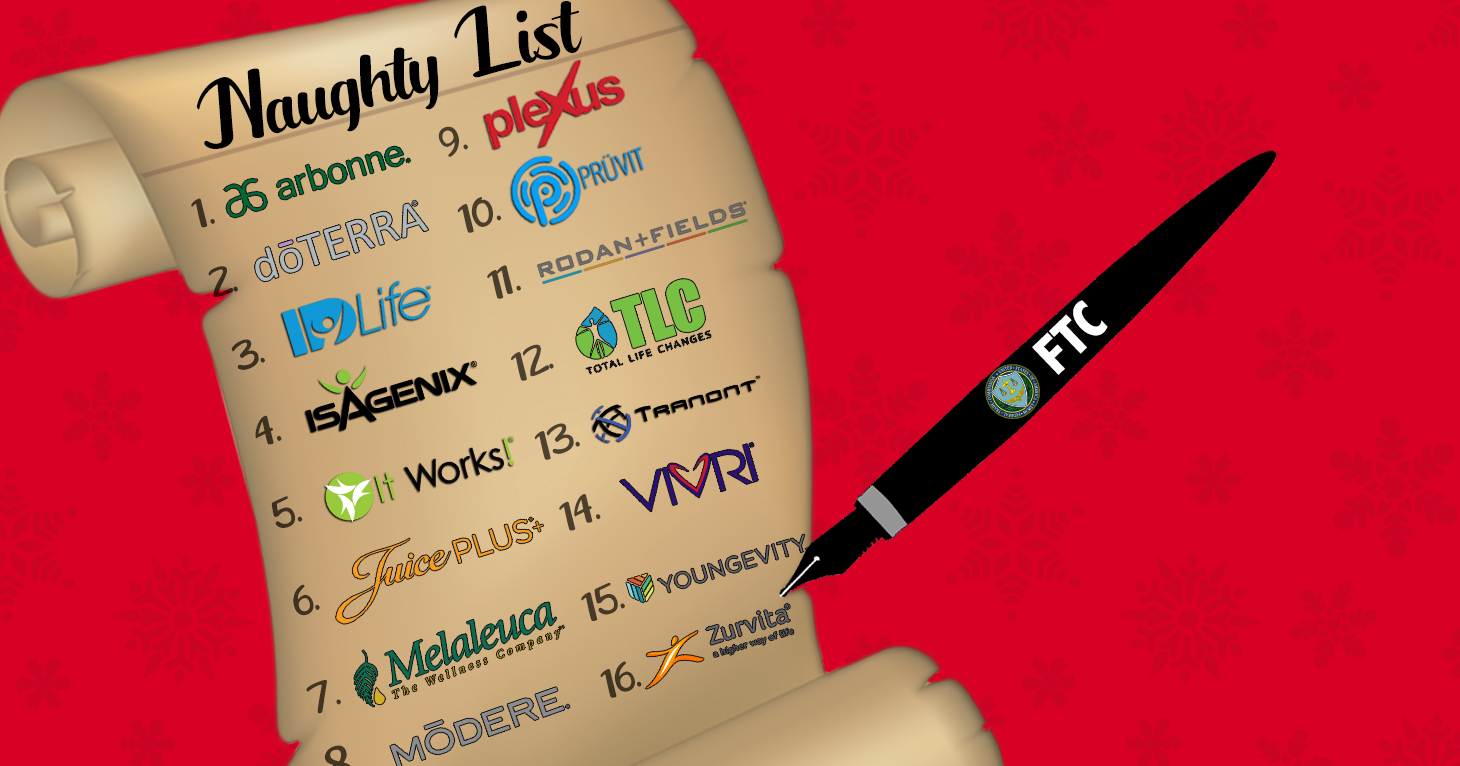
What You Should Know about USANA
Supplement MLM takes down dozens of deceptive claims following TINA.org investigation.
MLM takes down hundreds of deceptive income claims following TINA.org investigation.
Market America, a North Carolina-based Multilevel Marketing – a way of distributing products or services in which the distributors earn income from their own retail sales and from retail sales made by their direct and indirect recruits. that describes itself as a “product brokerage and internet marketing company,” and its larger-than-life founder James “JR” Ridinger like to stand out in the direct selling industry. For the company’s part, that means littering the internet with an unprecedented number of deceptive income claims related to the MLM’s business opportunity. As for Ridinger, his over-the-top performances at company events are must-see TV, even as (or perhaps because) they also often feature misleading earnings representations.
A TINA.org investigation found that in the first nine months of 2020, Market America published more than 450 deceptive income claims across its website, blog and social media pages. Among the marketing materials TINA.org collected that were published this year was a September tweet by Ridinger that shows him speaking at a Market America event saying the company’s business opportunity gives distributors “economic freedom.”
It wasn’t until TINA.org warned Market America last month that it would notify regulators if the company didn’t take immediate steps to remove the deceptive income claims, which included another 300 claims compiled by TINA.org that were published before 2020, that the company sprang into action. Within a couple weeks, Market America took down nearly all of the claims identified by TINA.org.
TINA.org’s investigation into Market America went beyond the deceptive marketing of the company’s business opportunity, but that’s a good place to start. Here’s what you should know about Market America.
According to the FTC, income claims must reflect the “actual experiences of typical participants.” To put it plainly, there was nothing typical about Market America’s income claims. At the center of the company’s deceptive marketing campaign were hundreds of “Power Profiles” of top-earning distributors. These included Ben Ginder, who, according to his write-up on the Market America website, has done quite well for himself as a distributor with the company:
Just looking at Ginder’s sprawling estate overlooking the Susquehanna River in Wrightsville, Pennsylvania and his enviable fleet of Lamborghini, Ferrari, Bentley, Rolls Royce, Aston Martin, and Mercedes automobiles convinces you of the wisdom of his choice. When he drives up to a major company event in his latest exotic car, he not only wants to elicit wonder, but also curiosity and a little motivation – “How can I get wheels like that?”
However, the reality is the majority of Market America distributors (or what the company calls “UnFranchise Owners” or UFOs) will never come close to earning life-changing income.
In response to TINA.org’s Oct. 8 warning letter, Market America removed Ginder’s page, along with a link on the company’s website to a section with nearly 100 Power Profiles. In addition, Market America, among other things, deleted a playlist of almost 300 Power Profile interviews on its YouTube channel (including the one seen below) and took down more than 200 social media posts with the #financialfreedom hashtag. Finally, all 14 posts cited by TINA.org on Ridinger’s Instagram account were also removed.
After Market America informed TINA.org that it had addressed the deceptive marketing issue, TINA.org amassed and provided the MLM a second, smaller sampling of misleading earnings claims made by the company and distributors who were following Market America’s lead with regard to misleading earnings claims. As of Oct. 28, the majority of those claims had been deleted.
TINA.org will continue to monitor Market America’s progress.
JR Ridinger needs a glass of water. He has worked himself into a coughing fit on stage. But the show must go on. He clears his throat, turns his body 180 degrees and resumes jogging. The giant hamster wheel lurches forward.
The hamster wheel stunt is a crowd-pleaser at Market America conventions, even as the bit sometimes involves Ridinger mocking distributors who struggle to find success in the MLM.
“We try to tell you, ‘Hey, wake up.’ You know, we actually have to start laughing at you,” Ridinger says in the clip above. “We have to laugh at you. ‘There goes the hamster but he ain’t got a tail to catch.’”
For Ridinger, a former Amway distributor who started Market America with his wife, Loren, in 1992, the hamster wheel is just the beginning. At company events, it’s also not unusual to see the company’s CEO yell at the tombstone of “Joe Nobody,” who worked himself to death instead of achieving financial freedom, or take a sledgehammer to a buzzing alarm clock meant to signify the “time freedom” distributors can obtain with Market America. Even late-night comedians like John Oliver have taken notice of Ridinger’s on-stage antics.
Work less, earn more and retire earlier than you would if you stayed in your current job – whether you’re an elementary school teacher, pharmacist or financial executive – is a popular refrain at Market America. But the truth is the company’s business opportunity is not a viable alternative to a typical nine-to-five job.
If you ask Ridinger, he might say the company sells residual income. It would be an easier answer than to list the range of products the company carries on a website, Shop.com, through which distributors are said to earn “shopping annuities” every time they or someone in their downline buys something on the site. Departments include auto, beauty, clothes, electronics, food and drink, health and nutrition, jewelry and pet supplies, just to name a few.
By “converting spending into earning,” Market America says, distributors create their own economy. With the e-commerce site, the company claims to be leading a “digital shopping revolution.” However, the tools that the site uses – real-time price comparisons and coupon codes – are not new.
Moreover, Market America concedes:
The cost is the same as it would be shopping directly from the store’s site, but Shop.com is able to pay Cashback, whereas individual sites do not.
This is not exactly true. Take this Nike sandal, which both Market America and Kohl’s, one of its “partner stores,” sells for $50. According to the product listing on the Kohl’s website, the sandal is eligible for both Kohl’s Cash and Kohl’s Rewards.
Also, according to the company’s list of partner stores, Kohl’s is among a number of stores for which Market America doesn’t actually offer cashback incentives.
In addition, the start-ups costs are not clear. While a Market America Google ad says there are no franchise fees, one distributor said (in a Power Profile that has since been taken down) she had to dip into one of her children’s bank accounts (plural) to get her Market America business up and running.
On July 8, Market America’s long-time executive vice president, Dennis Franks, hosted a video call that he billed as “an exciting and different type of Zoom presentation that I think every UnFranchise Owner should listen carefully to.” The featured speaker was Market America’s general counsel at the time, Clement Erhardt. Erhardt said the purpose of the call, which was live-streamed on Facebook, was to address “the heightened scrutiny that the Federal Trade Commission has put upon direct selling companies in part because of the COVID-19 crisis.” A month earlier, the FTC had sent a second round of warning letters to MLMs regarding health and earnings claims related to the coronavirus, bringing the total to 16 MLMs targeted by the agency. Erhardt, who has since left Market America, said:
Under no circumstances can we tie any income representation into the COVID crisis. What the FTC is looking at is they don’t want us to promote the UnFranchise business as a replacement for people who have lost their jobs, as a Plan B for people that have had problems because of the economic fallout from this pandemic. They don’t want any tie-in.
But by July, Ridinger had already provided distributors a roadmap to deceptively market the business opportunity in the context of the coronavirus. His choice of words would prove prophetic.
“There’s never been a better time to explore Plan B with the UnFranchise, because residual income gives you the ability to outlast any economic storm! Residual income is remedy for economic illness!” Ridinger wrote on Twitter on March 30. The tweet (seen below) featured an image of a face mask-clad Benjamin Franklin on the $100 bill. Just in case anyone missed it, he reposted the tweet on April 5, using the same term – Plan B – that Erhardt, the company’s general counsel, would explicitly caution distributors against using when promoting the business opportunity a few months later.
In the July 8 Zoom call Erhardt also gave TINA.org a shoutout as another consumer watchdog “out there” policing the direct selling industry that distributors should be aware of.
“If they see what they think is a violation they will go to the Federal Trade Commission and they will report the violation and many times the Federal Trade Commission will follow up,” Erhardt said.
Market America has enlisted a number of A-list celebrities to help pitch its business opportunity to recruits. At the MLM’s virtual International Conference in September, distributors heard from Grammy Award-winning singer Alicia Keys, “Desperate Housewives” star Eva Longoria and actress and singer Jennifer Lopez, among others. Here’s some of what they (and others) had to say:
Alicia Keys:
Even though it has been quite a surprising year for all of us, one that we could never have expected, I think in so many ways it’s given us a view into our character, into our grit, into our potential, into our possibility for really crafting and creating a world that we want to live in. And as entrepreneurs who are right there at the head of the pack, really able to decide what kind of business that you’re creating, what kind of people are you surrounding yourself with and how can you continue to be a visionary.
Eva Longoria, talking about JR and Loren:
I’ve learned so much just being in orbit around the brilliant stars that they are and I know that you are benefitting from this as well and so I hope you absorb their light as I do every time I’m around them. They just evoke so much wisdom every time they speak.
Jennifer Lopez (aka J. Lo):
Even though it’s tough, the strength inside you is even stronger. Now is your time to shine, now more than ever, to be all the things that you ever wanted to be. Being an entrepreneur is living your life in a way just for a few years that most people don’t so you can live the rest of your life the way most people can’t.
“Shark Tank” star Daymond John:
Market America makes people successful and entrepreneurship is more important now than ever before.
DJ Khaled, producer of the hip-hop/rap anthem “All I Do Is Win”:
We still hustling and we still winning. All the entrepreneurs look at us, we not stopping.
Also in virtual attendance at the Market America conference was Chicago Bulls legend Scottie Pippen (seen above), who has been a paid endorser of the company’s joint pain supplement, Isotonix, since 2010.
While Market America has so far escaped scrutiny from the FTC this year, it has not had the same luck with the FDA. In February, the agency sent Market America a warning letter over, among other things, its failure to report complaints it had received from customers who experienced serious side effects as a result of taking the company’s supplements. One of the complaints that went unreported to the FDA detailed the need to be hospitalized for abdominal pain, dizziness, shaking and chills, one week into a 21-day weight-loss challenge that included a supplement regimen. The FDA warning letter was addressed not to Ridinger but to the company’s president and chief operating officer, Marc Ashley, Loren Ridinger’s brother.
Market America wasn’t always a private company. From 1994 to 2001, Market America traded publicly as an over-the-counter stock.
However, the events leading up to the company going public were the focus of a SEC civil enforcement action that alleged violations of federal securities laws in 1999. At the center of the SEC’s probe was a backdoor deal between Ridinger and a former stockbroker, Gilbert Zwetsch, under which the parties agreed to split profits from sales handled exclusively by Zwetsch.
According to the SEC, the agreement wasn’t disclosed to prospective investors, which included Market America distributors who attended company-sponsored events where both Ridinger and Zwetsch talked up the stock ahead of its launch. Nor was the agreement between Ridinger and Zwetsch appropriately reflected in Market America’s SEC filings, the SEC alleged.
Market America’s stock began trading on Aug. 3, 1994. Between August 1994 and December 1995, Zwetsch sold some 1.8 million shares of Market America stock, sharing the proceeds with Ridinger as stipulated under their agreement, according to the SEC.
To settle the SEC’s charges, Ridinger and Zwetsch, among other things, agreed to collectively pay back more than $1.2 million in ill-gotten gains and $350,000 in penalties. Under the settlement, Ridinger and Zwetsch are prohibited from violating federal securities laws. Neither admitted wrongdoing.
Despite the fact that most people who get involved in multilevel marketing make little to no money, Market America claimed all types of incomes are attainable as a distributor with the company: replacement income, residual income, full-time income, even hurricane-proof income. Market America is also a big fan of ongoing income, which implies that distributors can expect to earn a steady income.
But when asked in a 2012 bankruptcy filing to describe any expected increase or decrease in income within the year, a Market America distributor who had been with the company for two years couldn’t give a clear answer.
“Market America Change: income fluctuates all the time,” the distributor wrote in what can be described as a best-case scenario for the majority of Market America distributors, many of whom likely end up losing money in the venture. Not to mention, whatever income the distributor earned was not enough to avoid bankruptcy.
TINA.org reviewed a small sampling of personal bankruptcy filings by Market America distributors. These filings show distributors thousands of dollars in debt, some of which is attributed to credit cards affiliated with Market America. In a September 2018 blog, Market America encourages distributors to sign up and get others to sign up for one of its two Shop.com credit cards. “What better way to build your shopping annuity?” the blog says. Meanwhile, the company claims that the shopping annuity “provides an economic solution for individuals who desire financial freedom.” To sum up: Market America is imploring distributors to charge purchases to a credit card to get out of debt.
As difficult as it may be for current Market America distributors to give a clear answer regarding how much they expect to earn (or lose) in the coming year, prospective Market America distributors may have an even harder time (see next section).
Market America does not show its distributors the money, which is to say, it does not publish an annual income disclosure statement that might shed some light on the typical earnings – notice we didn’t say average earnings – of distributors.
This information would be useful for prospective distributors weighing a decision to join Market America. (Of note, until TINA.org warned Market America, Googling “Market America income disclosure statement” only brought up more deceptive income claims by the company.)
According to a class-action lawsuit filed against Market America in 2019, more than 90 percent of the company’s distributors lose money. This is consistent with statements by the FTC that most people who join MLMs earn little to no money.
The bottom line? As a 28-year veteran of the MLM industry with seasoned lawyers on staff, Market America should not have to be reminded of the rules. And the rules state that using atypical earnings claims to recruit distributors is not only deceptive, it’s against FTC law.
TINA.org reached out to Market America for comment on this story. Check back for updates.
Read more about TINA.org’s warning letter to Market America here.
Supplement MLM takes down dozens of deceptive claims following TINA.org investigation.
Deceptive health and income claims, including some tied to COVID-19, persist in wake of warning from the feds.


